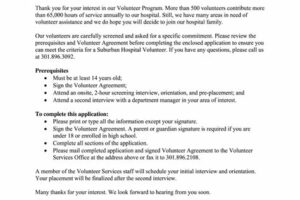Table of Contents
Discover various areas to volunteer in a hospital and make a positive impact on patient care. Explore opportunities like assisting in the emergency department, supporting administrative tasks, comforting patients as a volunteer in palliative care, or lending a helping hand in the pediatric ward. Find your passion and contribute to the well-being of others by volunteering in a hospital.
Are you looking for a rewarding way to give back to your community? Why not consider volunteering at a hospital? With numerous areas to choose from, there is bound to be a role that aligns with your interests and skills. Whether you want to interact directly with patients or prefer to work behind the scenes, hospitals offer a range of opportunities that can make a significant impact on the lives of others. From assisting in the emergency room to comforting families in the waiting areas, volunteering in a hospital allows you to be part of a vital support system during challenging times. So, if you are ready to lend a helping hand and contribute to the well-being of those in need, read on to discover the various areas where your skills and compassion can truly shine.
Areas To Volunteer In A Hospital
Volunteering in a hospital is a rewarding experience that allows individuals to give back to their community while making a positive impact on the lives of patients and medical staff. Hospitals are always in need of volunteers who are willing to lend a helping hand in various areas. Whether you have a passion for patient care, administrative tasks, or providing emotional support, there is a role for everyone. Here are some popular areas to consider volunteering in a hospital:
Patient Comfort and Support
One of the most fulfilling roles as a hospital volunteer is providing comfort and support to patients. This can involve spending time with patients, engaging in conversation, playing games, or simply offering a listening ear. Volunteers in this area play a vital role in improving the overall well-being of patients and bringing a smile to their faces.
Administrative Tasks
Behind the scenes, hospitals require assistance with administrative tasks to ensure smooth operations. Volunteers can help with answering phone calls, filing paperwork, organizing medical records, and scheduling appointments. By taking on these responsibilities, volunteers contribute to the efficiency of the hospital and help staff focus on providing quality care.
Emergency Department Support
The fast-paced environment of the emergency department can often be overwhelming for both patients and medical professionals. Volunteers can provide support by assisting with patient check-ins, comforting anxious individuals, restocking supplies, and facilitating communication between patients and healthcare providers. This role requires compassion, adaptability, and the ability to remain calm under pressure.
Information Desk
As a volunteer at the information desk, you become the first point of contact for visitors, patients, and their families. Your role is to provide directions, answer questions, and offer guidance. This position requires excellent communication skills, a friendly demeanor, and the ability to handle various inquiries efficiently. By helping people navigate the hospital, you contribute to a positive experience for all.
Children’s Ward
Volunteering in the children’s ward is a heartwarming experience that allows you to bring joy and laughter to young patients. Whether it’s organizing playtime activities, reading stories, or offering companionship, your presence can make a significant difference in their hospital stay. This role requires patience, creativity, and a genuine love for children.
Pet Therapy
Animals have a remarkable ability to provide comfort and emotional support to individuals, particularly those in healthcare settings. If you have a friendly and well-behaved pet, you can volunteer for pet therapy programs. These programs involve visiting patients and allowing them to interact with your pet, which can help reduce stress, provide companionship, and brighten their day.
Palliative Care
Volunteering in palliative care involves providing comfort and support to patients who are facing serious illnesses or at the end of life. As a volunteer, you may assist with basic patient care, offer companionship, or help create a peaceful environment. While this role requires emotional resilience, it also offers an opportunity to make a profound impact on individuals during their most vulnerable moments.
Rehabilitation Services
If you have an interest in physical therapy or occupational therapy, volunteering in rehabilitation services can be a fulfilling choice. Volunteers may assist therapists with exercises, accompany patients during therapy sessions, and provide motivation and encouragement. This role allows you to witness the progress and resilience of patients as they work towards regaining their independence.
Outpatient Clinics
Volunteering in outpatient clinics involves assisting patients with their appointments, guiding them through the check-in process, and offering support while they wait. This role requires excellent organizational skills, empathy, and the ability to maintain confidentiality. By volunteering in outpatient clinics, you contribute to a smooth and positive experience for patients seeking medical care.
Hospital Events and Fundraising
Hospitals often organize events and fundraisers to raise awareness and funds for various causes. Volunteers can assist in planning and executing these events, as well as help with fundraising efforts. This role allows you to combine your passion for community involvement with event management skills, all while supporting the hospital’s mission.
In conclusion, volunteering in a hospital offers a range of opportunities to make a meaningful difference in the lives of others. Whether you choose to provide patient comfort, assist with administrative tasks, or participate in hospital events, your contribution will be invaluable. Consider exploring these diverse areas and find the perfect fit to start your rewarding journey as a hospital volunteer.
Areas To Volunteer In A Hospital
When it comes to volunteering, few places offer as many diverse opportunities as a hospital. From providing companionship to patients to assisting with administrative tasks, the areas to volunteer in a hospital are vast and varied. Each role plays a crucial part in enhancing the overall patient experience, easing the workload of healthcare professionals, and ensuring the smooth operation of the hospital. Let’s delve into some of the key areas where volunteers can make a significant impact.
Patient Care Support
Volunteering in patient care support is an essential role that involves providing companionship and emotional support to patients during their hospital stay. Volunteers spend time engaging in conversations, listening attentively, and offering a comforting presence. They also assist with basic patient care tasks such as serving meals, helping with personal hygiene, and ensuring patients are comfortable. Additionally, volunteers play a vital role in patient transport within the hospital premises, ensuring that patients are safely and efficiently moved between different departments. Their presence not only brings a sense of calm but also lightens the workload for healthcare professionals, allowing them to focus on medical treatments and procedures.
Administrative Support
The administrative support area is where volunteers showcase their organizational skills and attention to detail. From filing documents to managing medical records, these individuals contribute to the efficient functioning of the hospital’s administrative processes. They also assist in appointment scheduling, ensuring that patients’ needs are met in a timely manner. Additionally, answering phone calls and directing inquiries to the appropriate departments helps streamline communication and enhance overall patient satisfaction. Volunteers in this area play a crucial role in maintaining the smooth flow of information within the hospital, enabling healthcare professionals to focus on delivering quality care.
Emergency Department Assistance
Volunteering in the emergency department requires individuals with empathy, the ability to remain calm under pressure, and a willingness to quickly adapt to changing situations. Volunteers aid healthcare professionals by stocking supplies, preparing patient rooms, and providing comfort to patients and their families during crises. Their presence is invaluable in creating a supportive environment during times of uncertainty and distress. By lending a helping hand in these high-stress situations, volunteers contribute to the efficient functioning of the emergency department and ensure that patients receive the care they desperately need.
Rehabilitation Services
In the rehabilitation services department, volunteers play a crucial role in supporting patients who are recovering from injury or illness. They provide emotional support, engage patients in therapeutic activities, and aid them in their physical rehabilitation exercises. Collaborating closely with physical therapists and occupational therapists, volunteers help create personalized care plans for patients, ensuring they receive the necessary support and encouragement on their journey to recovery. By offering companionship and assistance, volunteers contribute to the overall well-being and progress of patients in the rehabilitation services department.
Children’s Ward Support
Volunteering in the children’s ward is an opportunity to make a significant difference in the lives of young patients. Volunteers spend time with children, organizing recreational activities and providing a sense of normalcy during their hospital stay. Working closely with child life specialists, volunteers create a positive and comforting environment that promotes healing and emotional well-being. Whether it’s playing games, reading stories, or simply engaging in conversation, volunteers bring smiles to the faces of young patients, helping them cope with their medical conditions and fostering a sense of hope and resilience.
Geriatric Care
Elderly patients often experience loneliness and isolation during their hospitalization. Volunteers in the geriatric care department offer companionship and assistance to these individuals, providing support with activities of daily living and engaging in meaningful conversations. By fostering social interaction and offering a comforting presence, volunteers help combat the emotional challenges faced by older adults. Their involvement plays a pivotal role in ensuring that elderly patients feel valued, respected, and cared for during their time in the hospital.
Laboratory Support
Volunteering in the laboratory support area involves tasks such as labeling and delivering specimens, organizing laboratory supplies, and assisting with data entry. These volunteers contribute to the smooth operation of the hospital’s laboratory services, enabling healthcare professionals to focus on analyzing test results and providing accurate diagnoses. Their attention to detail and precision in handling samples and maintaining inventory help maintain the integrity of laboratory processes. By supporting the laboratory staff, volunteers indirectly contribute to the overall quality of patient care.
Hospital-based Fundraising
Volunteers involved in hospital-based fundraising play a vital role in securing financial resources to support various initiatives within the hospital. They assist in organizing and promoting fundraising events, reaching out to potential donors, and coordinating donation drives. By actively engaging with the community, volunteers raise awareness about the hospital’s needs and encourage individuals to contribute towards medical research, advanced equipment, and enhanced patient care services. Their dedication and passion for fundraising ensure that the hospital can continue to provide exemplary care to its patients.
In conclusion, the areas to volunteer in a hospital are diverse and encompass various aspects of patient care and hospital operations. Whether it’s offering companionship to patients, providing administrative support, or aiding in emergency situations, volunteers play a crucial role in enhancing the overall hospital experience. Through their selfless efforts, they bring comfort, joy, and hope to patients and their families, making a lasting impact on the well-being of those in need.
When it comes to volunteering, one of the most impactful and rewarding experiences can be found within the walls of a hospital. Hospitals are bustling hubs of medical care, filled with dedicated professionals working tirelessly to save lives and improve the well-being of their patients. While doctors and nurses play a vital role, volunteers also have the opportunity to make a significant difference in the lives of those in need.
1. Patient support and companionship:
- Volunteers can provide much-needed companionship to patients who may be feeling lonely or isolated during their hospital stay.
- They can offer a listening ear, engage in friendly conversations, or simply provide comfort by being present during difficult times.
- Volunteers can also assist in patient education by providing information on various health conditions, treatments, or resources available to them.
2. Administrative assistance:
- From answering phone calls and directing visitors to managing paperwork and organizing medical records, volunteers can provide invaluable administrative support to hospital staff.
- By taking on these tasks, volunteers free up time for medical professionals to focus on patient care.
- Additionally, volunteers can help with scheduling appointments, coordinating transportation for patients, or even assisting with discharge processes.
3. Specialized programs:
- Hospitals often have specialized programs aimed at improving the quality of life for patients in specific areas such as pediatrics, geriatrics, or mental health.
- Volunteers can participate in these programs by engaging in activities like reading to children, organizing recreational events, or providing emotional support to patients with mental health challenges.
- These programs not only bring joy to patients but also contribute to their overall well-being and recovery.
4. Fundraising and community outreach:
- Hospitals rely on financial support from the community to maintain their services and facilities.
- Volunteers can contribute by organizing fundraising events, participating in awareness campaigns, or reaching out to potential donors.
- They play a vital role in building connections between the hospital and the community, fostering collaboration and support for the institution.
5. Emergency response and disaster relief:
- In times of crisis or natural disasters, hospitals are often at the forefront of providing emergency medical care.
- Volunteers trained in first aid, CPR, or disaster response protocols can assist medical staff during these critical times.
- They may help with triaging patients, providing comfort to those affected, or assisting in logistical operations.
By engaging in volunteer work within a hospital, individuals can offer their time, skills, and compassion to improve the lives of patients and support the healthcare system as a whole. Whether it’s through patient support, administrative assistance, specialized programs, fundraising, or emergency response, volunteers play an essential role in creating a caring and thriving environment within hospitals.
Thank you for taking the time to visit our blog and learn more about the various areas where you can volunteer in a hospital. We hope that this article has provided you with valuable insights and inspired you to consider giving back to your community through volunteer work. As a journalist, it is my duty to inform and engage readers, and I am glad to have had the opportunity to do so through this piece.
Volunteering in a hospital is not only a way to make a positive impact on the lives of others but also a chance to gain valuable experience and skills that can benefit you personally and professionally. Whether you are interested in direct patient care or providing support behind the scenes, there are numerous opportunities available within a hospital setting.
One area where you can volunteer is in the pediatric ward. Children who are hospitalized often endure long stays that can be emotionally and physically draining. By volunteering in this department, you can bring joy and comfort to these young patients through playtime, storytelling, or simply being a friendly presence. Your involvement can help alleviate their stress and make their hospital experience a little brighter.
Another area where your assistance is greatly needed is in the emergency room. Volunteering here requires a strong sense of compassion and the ability to remain calm under pressure. You may be responsible for greeting and directing patients, providing comfort to their families, or assisting medical staff with non-medical tasks. Your presence in the ER can make a significant difference during critical moments and contribute to the overall efficiency of the department.
Lastly, volunteering in the administrative department of a hospital is an excellent option for those who prefer a more behind-the-scenes role. Here, you can assist with tasks such as filing, data entry, or answering phone calls. Your support allows hospital staff to stay organized and focused on delivering quality care to patients. Additionally, this experience can provide you with valuable insight into the administrative side of healthcare, which may be beneficial if you are considering a career in this field.
In conclusion, volunteering in a hospital offers a unique opportunity to make a difference in the lives of others while gaining valuable skills and experience. Whether you choose to volunteer in the pediatric ward, emergency room, or administrative department, your contribution is invaluable. We encourage you to reach out to your local hospitals and inquire about volunteer opportunities. Together, we can create a supportive and compassionate community that truly makes a difference.
.
1. What are some areas where I can volunteer in a hospital?
There are several areas where you can volunteer your time and skills in a hospital setting. Some common areas include:
- Volunteering at the reception desk: This involves greeting patients and visitors, providing them with information, and directing them to their intended destinations.
- Assisting in patient transport: This role involves helping patients move to different parts of the hospital, such as from their room to a scheduled procedure or therapy session.
- Working in the gift shop: If you enjoy customer service, you can contribute by assisting customers in the hospital’s gift shop, helping them find items and processing transactions.
- Supporting in administrative tasks: Hospitals often need help with paperwork, data entry, and other administrative duties. Volunteering in this area can provide valuable assistance to staff members.
- Providing companionship to patients: Many hospitals have programs where volunteers spend time with patients, engaging in conversation, reading, playing games, or simply offering companionship during their stay.
- Assisting in the emergency department: Volunteers in this area may help with non-medical tasks such as restocking supplies, comforting patients and their families, or directing traffic in the waiting area.
2. How do I become a hospital volunteer?
The process of becoming a hospital volunteer may vary depending on the specific institution. However, here are some general steps to follow:
- Contact the hospital: Reach out to the volunteer services department or the designated contact person at the hospital to express your interest in volunteering.
- Attend an orientation: Most hospitals require potential volunteers to attend an orientation session where they learn about the hospital’s policies, procedures, and expectations.
- Complete necessary paperwork: You may need to fill out an application form, provide identification, and consent to a background check or health screening.
- Undergo training: Depending on the role you choose, you may receive specific training to ensure you are well-prepared for your responsibilities.
- Start volunteering: Once you have completed the necessary steps, you can begin volunteering in your chosen area within the hospital.
3. Can I volunteer if I have no medical experience?
Absolutely! Hospitals value volunteers from various backgrounds, and not all roles require medical experience. Many tasks focus on providing support, comfort, and assistance to patients and their families. Administrative tasks, patient transport, and working in the gift shop are examples of roles that do not necessarily require medical expertise.
4. What are the benefits of volunteering in a hospital?
Volunteering in a hospital offers numerous benefits, including:
- Gaining valuable experience: Volunteering allows you to develop skills, such as communication, empathy, and teamwork, which can be beneficial for future career pursuits in healthcare or other fields.
- Contributing to the community: By volunteering, you become an integral part of the healthcare system, making a positive impact on the lives of patients and their families.
- Learning about healthcare: Being in a hospital environment provides an opportunity to learn about various medical conditions, treatments, and the healthcare industry as a whole.
- Personal growth: Volunteering can enhance personal growth by boosting self-confidence, improving interpersonal skills, and fostering a sense of fulfillment through helping others.
- Networking opportunities: Volunteering in a hospital allows you to interact with healthcare professionals, potentially expanding your professional network for future endeavors.
5. Can I choose my volunteer schedule?
Most hospitals offer flexibility when it comes to volunteer schedules. They understand that volunteers have other commitments and obligations. Typically, you can discuss your availability with the volunteer services department and find a schedule that suits both your needs and the hospital’s requirements.






